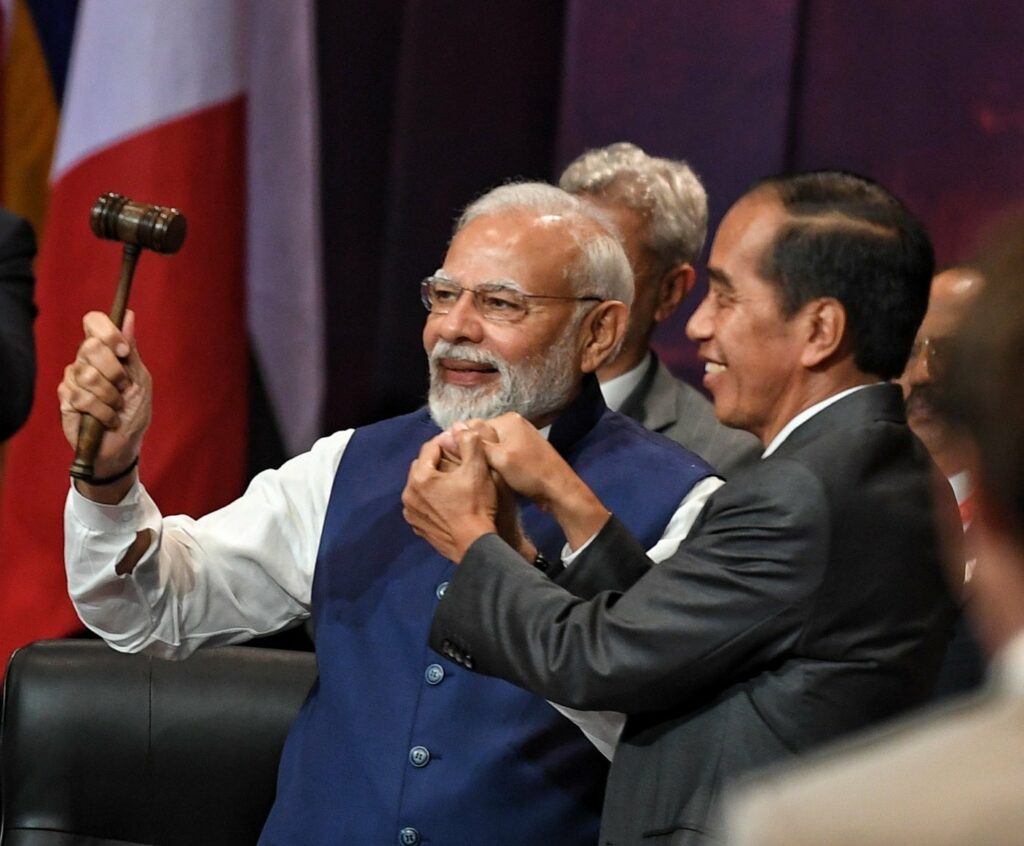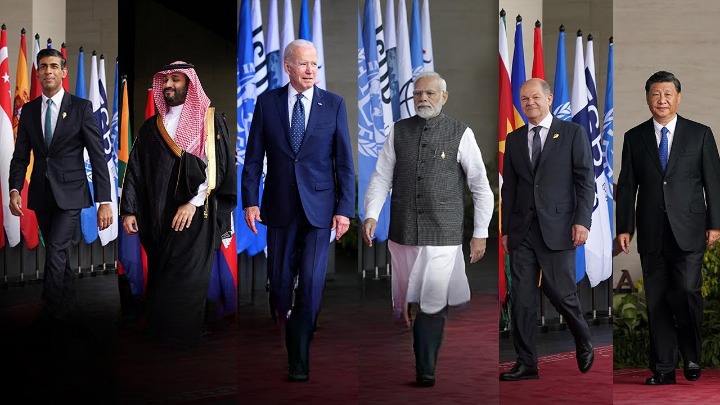|
Getting your Trinity Audio player ready...
|

- India wishes to change the face and outlook of G20, which used to be traditionally dominated by western concerns and agendas.
- India played a very critical role in drafting the outcome document of the summit.
- India has devised a three-element strategy which would help the global players in conflict resolution.
- Ad hoc choices, kneejerk reactions, and unstable policy paradigms are causing antipathetic repercussions to India’s own interests, geo-strategically and economically.
- India values the classical diplomatic craft of continued systemic negotiations with the art of effective and efficient communication, which is one of the key elements of Dr Jaishankar’s foreign policy doctrine.
The recently concluded G20 Summit in Bali, Indonesia has had several significant strategic takeaways for India, as the third decade of the 21st century is experiencing a different scale of hybrid warfare in multiple Geo strategic locations which have significant political and military bearings on not just India but the entire world. The G20 platform Happens to be the most significant international grouping in the world. The G20 countries represent 85% of the global GDP, 75% of world trade and 66% of the world’s population. The principal agendas in this year’s summit were focused on global growth, food and energy security, environmental concerns, health security and digital transformation, especially in the light of the new age of hybrid warfare.
Although the central focus of the countries was supposed to be the economic restoration and recovery from the COVID-19 pandemic, the discussions and western concern over the Russia-Ukraine war overshadowed all other discussions and issues at this summit. As we are witnessing in these times of conflict and uncertainties, most of the multilateral negotiations do down the wire with inconclusiveness and lack of clarity for charting out a stable future, despite several trials and tribulations being simmered, with the objectives of mutual consensus and confluence of strategic interests. But India played a pivotal role in upholding the mantle of multilateralism by bringing in diverse conversations from climate change to disruptive technological transformation in the world.
Assessing India’s strategic role
As India is taking up the presidency of the G20 summit for 2023, it wishes to bring about certain crucial paradigm shifts. From decoupling the western concerns of Europe’s military and energy security, with the common global concern about environmental security and disruptive digital transition, India wishes to change the face and outlook of G20, which used to be traditionally dominated by western concerns and agendas. India is aiming to democratise the discussions, deliberations and setting agendas based on the world’s economic and political needs rather than the obsessions and dogmas which were traditionally discarded as the concerns of the third world. India’s Prime Minister Narendra Modi spoke about how India is taking over the G20 at a time of crisis and chaos in the world. He stressed the need to address the concerns arising out of the once-in-century-disruptive pandemic and its aftermath. He raised concerns about how the contemporary conflicts including the Russia-Ukraine war have been instrumental in pushing the world towards economic and political uncertainty of an unprecedented scale. He made a pledge that shared knowledge and shared prosperity would be India’s critical strategic vision for creating an international outreach which would impact the “last person to the last mile”.
“This is not the era of war; returning to the path of conflict resolution, dialogue and diplomacy are key, for establishing global peace”
– PM Narendra Modi
In this 2022 G20, India played a very critical role in drafting the outcome document of the summit. India has devised a three-element strategy. 1) Constructive 2) Co-operative 2) Consensus Building which would help the global players in conflict resolution. This has been a result of a successful negotiation process in which most of the G20 members have indicated their consent. India has kept the global context of the Russia-Ukraine war and has pitched forward its new model of peacebuilding.

In managing international conflicts, and border disputes and ensuring stable relations with other nations, India is facing oodles of challenges. The dilemma in strategic choices amidst and with, the powerful nation-states and orchestrating the paradox of decision-making in foreign affairs often turns out to be a convoluted riddle. Ad hoc choices, kneejerk reactions, and unstable policy paradigms are causing antipathetic Repercussions to India’s own national interests, Geo-Strategically and economically. This is especially true in India’s border disputes with china as it has only succeeded in the first stage of military disengagement, but has failed to initiate the critical processes of de-escalation and de-Induction, not just on the military front, but also on the diplomatic front. The issues of dealing with illiberal autocratic regimes, with facing the freedom of navigation issues in the Indo-Pacific, India is facing its own geo-strategic dilemma. Although India believes in the execution of its strategic autonomy principle when it comes to dealing with the internal security situation, it has always looked forward to constructing a peaceful multilateral add multiple world order with the diversification of power centres. In the next G20 summit India is also expected to pitch the agenda for a multipolar world order.
India is planning to set up a Conflict Resolution Mechanism at the next G20 summit in 2023. With the constitution of a new Institutionalized and modernized conflict resolution mechanism, India is aiming to make an attempt to peacefully tackle International conflicts, disputes, and differences. This can be achieved if we transcend from the static Peacekeeping approach to a more evolved peace-making approach. By taking a look at India’s approach, it appears that India is following Galtung’s model of peacebuilding. The transformational changes can be witnessed in the Triadic model of Conflict Resolution, also known as transcend method, propounded by Johan Galtung (A prominent peace studies scholar) which includes A) Mapping B) Legitimizing and C) Bridging. This will be a decisive step in putting end to Long-standing violent and unresolved conflicts both Within India’s borders and for external conflicts like the ongoing Russia-Ukraine war or the Armenia and Azerbaijan conflict in the Nagorno-Karabakh region. PM Modi has already indicated the peacebuilding agenda through his statement, “This is not the era of war; returning to the path of conflict resolution, dialogue and diplomacy are key, for establishing global peace”. (paraphrased)
India through its G20 leadership aims to bring about a new dimension of peacebuilding for a more stable 21’st century world.
India wishes to express to the world that communication is indeed challenging, but by bringing in diplomatic expertise, we can successfully engage in the process of thinking, sensing, understanding and transmitting the messages to ensure that the messages sent must be the messages received and not distorted at any cost indicating the significance of marshalling the strategic communications process. This is a testimony to the fact that India values the classical diplomatic craft of continued systemic negotiations with the art of effective and efficient communication, which is one of the key elements of Dr Jaishankar’s foreign policy doctrine for a new and resurgent 21st-century world.
But for all these intended actions to be initiated and executed effectively, support of the institutional diplomatic framework is a must. India through its G20 leadership aims to bring about a new dimension of peacebuilding for a more stable 21’st century world.
(The author has an MA in International Relations. Views expressed are the author’s own)
Viswapramod is a PhD Scholar at the Department of International Studies and Political Science, Christ University, Bangalore. He has an MA in International Relations. Views expressed are the author’s own.

lt is one more good article from Vishwapramod.
” lndia as a peace keeping country, at the domestic level , and lndia as a peace making country at the global level ” …lt makes a lot of difference…. I feel proud to be an lndian, with a global leader like Narendra modi, whose words like ” This is not an era for war ” , his words received worldwide with great weightage and respect.. My heart swells with unexplainable joy to note that next G 20 will be held under Modi’s
guidance and leadership..
All these developments reminds me the age old lndian belief ” Vasudaiva Kutumbakam ”
Thanking the writer of this article again..